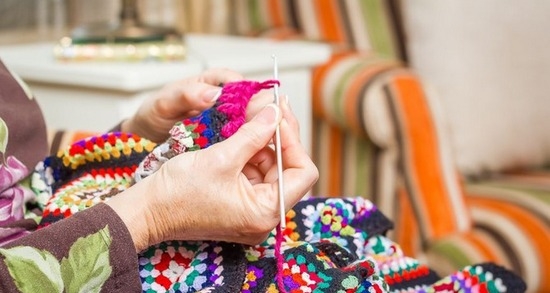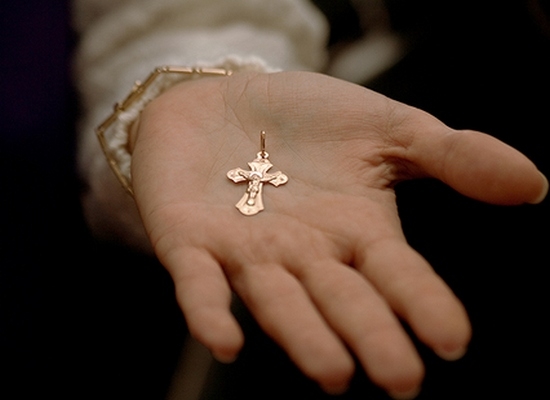How to deal with the death of a husband at a young age. How to survive the death of a husband: not to break down and return to life after an irreparable loss.
Losing loved ones is scary. It seems that the door is about to open, and he will again appear on the threshold, and, as always smiling, will begin to tell you something. The hand from time to time reaches for the phone, but the painfully familiar number will never be available again. The emptiness that has formed in the soul resembles a puzzle that has been pulled out of the whole picture and it will never fall into its usual place. And the only thought that constantly pulsates in my head is how not to go crazy, each time returning to an empty apartment where he is no longer there? This state can drag on for a long time and cause many diseases of the soul and body. But life goes on after the death of her husband! You just need to accept it and look at the world with different eyes.
Grief is a normal and healthy human response to loss. Describe the emotions you feel when you lose someone or something important to you. People mourn for different reasons, including. Lifestyle, for example, during retirement or when moving to a new place.
- Death of a loved one, including pets.
- Divorce or relationship changes, including friendships.
- Changes in your health or health loved one.
- Job loss or changes in financial security.
How to survive the death of a beloved husband?
The first few days there is no point in trying to calm yourself and try to get out of the stupor. The psyche is arranged in such a way that “inhibition” is triggered for any strongest stress. This is disconnected from outside world the condition is necessary for the body to keep the psyche healthy. But the funeral and commemoration are held, all death certificates are collected, and the widow begins to think more and more about how to live after the death of her husband. Medicines that were designed to numb the pain for the first time are gradually becoming dangerous, and a woman who has lost a loved one needs to learn to control her own destiny again. This usually happens with the support of friends and loved ones. But it happens that there is no one around and there is simply no one to share the pain of loss with. How do you deal with the death of your husband on your own? To do this, you should listen to some tips:
You may experience grief if you or a loved one is diagnosed serious illness or a serious illness occurs. You may grieve about future plans you have made or how you will change your life. Grief is different for every person. It can include many emotional and physical symptoms, including.
Grief is sometimes described as a five-step process: denial, anger, negotiation, depression, and acceptance. All of these reactions to loss are normal. However, not everyone in mourning experiences all of these reactions. And they don't all experience them in the same order. It is common to repeat some of these reactions, stages, and symptoms more than once.
- The main thing to do is come to terms with what happened. Human nature has its own laws. Some people leave earlier, others later. No matter how difficult it is to realize that your loved one will no longer be around, you need to gain strength and start every day with the words: “What will be, will not be avoided. Husband can't be returned. But maybe someday we will meet and be together again.
- The death of a husband is an occasion to think about how to live "for yourself." It is necessary to fill the void that has formed in life with something. You need to understand that it was his life that ended, and the life of everyone else continues. Only good and kind memories should be left in memory. And together with them it is important to enjoy every day the life that remains after the departure of the spouse: the singing of birds, the rustle of leaves in the wind, interesting book etc.
- In the question of how to survive the death of a husband, psychologists advise being distracted by charity and good deeds. You can find the same widows who have just recently lost a loved one, and help them get back on their feet after the loss. You can write letters to those who have experienced grief, support people who are in the hospital, or engage in creativity. In other words, any activity should be aimed at the creation, and not the destruction of the individual by constant thoughts about his loss.
- The main rule after the loss of a spouse is not to withdraw into yourself. Loneliness is useful if it is not abused. Today there are many places where you can make new friends, calmly "go out in public" and not be afraid of condemnation from the outside. Having invaluable family experience, you can share it with young couples.
The support of loved ones is great value for those who know the grief of the loss of a beloved man. But even with their help, not every woman can quickly recover from the experience. In some cases, the transition to a new life takes at least four years. And during this period it is very important not to stand still, but to try to move forward at least in small steps.  You can't shut yourself up and the best remedy- access to people. Eternal vanity will help you look around and realize your place in this world. Perhaps, over time, it will even be possible to remarry after the death of her husband. But for this to happen, you need to let go of the previous and main love of your life. For example, to promise your departed spouse, to enjoy every new day. Swear to him that he will be remembered, and every day to prove that everything is fine and life does not stand still. People who have passed away see everything that happens in the world. When they see the tears of their loved ones, they also feel bad. Therefore, the best thing that can be done for a departed loved one is to start another life with a smile.
You can't shut yourself up and the best remedy- access to people. Eternal vanity will help you look around and realize your place in this world. Perhaps, over time, it will even be possible to remarry after the death of her husband. But for this to happen, you need to let go of the previous and main love of your life. For example, to promise your departed spouse, to enjoy every new day. Swear to him that he will be remembered, and every day to prove that everything is fine and life does not stand still. People who have passed away see everything that happens in the world. When they see the tears of their loved ones, they also feel bad. Therefore, the best thing that can be done for a departed loved one is to start another life with a smile.
There is no "correct" way to duel. Give yourself time to experience the loss in your own way. At the same time, don't forget to take care of yourself. Allow yourself to cry, feel nothing, get angry, or feel whatever you are experiencing. Express your feelings. Talk about how you treat others. Or find a creative way to express your feelings. This may include art, music, or journaling. Get back to your normal routine as soon as possible. Try to keep up with your daily tasks so you don't feel overwhelmed. Avoid alcohol. Alcohol is a depressant that can affect your mood, so it can make you feel even more sad. Avoid making important decisions. It takes time to adjust to the loss and return to normal. Making an impulsive decision during a time of grief can lead to increased stress during a difficult time. Try to wait a year before making big changes like moving or changing jobs. Take a break. Take breaks from grief by participating in activities you enjoy. It's okay not to feel sad all the time. Laughter is good for you. Get help if you need it. You don't have to face this alone. Contact friends, family, clergy, counselor or therapist, or support groups. If your symptoms do not improve, or if you feel you need more help, contact your family doctor.
- Feel your loss.
- It hurts, but it's natural and normal.
- It suits your physical needs.
- Get enough sleep, maintain a balanced diet, and exercise regularly.
The loss of a loved one hurts unbearably. If the second half has gone to another world, it is very difficult for a woman to come to terms with this. It seems that life has lost all meaning, and the future seems gray and painful. How to cope with despair, how to survive the death of a husband? The advice of a psychologist and a priest will help you look at what happened with different eyes.
You may start to feel better after 6-8 weeks. The whole process can take from 6 months to 4 years. You may start to feel better little by little. In the morning it will start to get up a little easier, or maybe you will have more energy. This is the time when you will begin to reorganize your life around your loss or without your loved one. During this time, you may feel like you are going through a series of ups and downs. It may be better one day, but worse the next day.
Over time, you will begin to become interested in other people and activities again. If you've lost a loved one, it's normal to feel guilty or disloyal during this time. It's also normal to relive some of your feelings of pain on birthdays, anniversaries, holidays, or other special occasions.
When a husband dies, all the foundations of a familiar, full of happy moments and plans of life collapse. The house is surrounded by familiar things and joint photos, a native voice sounds in memory, and what happened seems like a terrible dream ... After realizing the tragedy, the woman experiences shock, her behavior becomes uncontrollable. The cessation of the widow's uncontrollable weeping may seem like a relief. In fact, this does not mean that the pain has subsided. The consequences of a strong psychological blow can lead to deep depression and seriously affect health.
While it's normal to feel sad after a loss, the feelings associated with pain should be temporary. Sometimes feelings last longer, or you may have problems with your emotions. When this happens, grief can turn into depression. The symptoms of grief and depression are similar. Signs that you may be suffering from depression include.
If you feel like you are having difficulty with your emotions, seek help. Your family doctor can help you treat your depression so you can start to feel better. It can also help you determine what other type of support you need. This may include a support group, individual therapy, or treatment.
The opinion of psychologists: "There is a way out!"
Experts studied emotional state many people who had to endure the death of loved ones, and found out that there is a "grief reaction syndrome". Of course, due to individual characteristics, the reaction to loss cannot be absolutely the same, but common features, of course, there is. When starting a conversation on the topic “How to survive the death of a beloved husband?”, Psychologists advise the widow to become aware of her feelings and emotions, which change in accordance with the stages of grief:
Questions to ask your doctor
Would medication help me? . This information is an overview and may not apply to everyone. Talk to your family doctor to see if this information applies to you and learn more about this topic. Mourning therapy is a good alternative to coping with the death of a loved one. Learn how it works and see how to move forward. Everyone has their own way of finding relief from pain.
The death of someone dear is like a wound. At first it bleeds, it burns, the pain is almost unbearable. The healing process of this wound is long and painful. Mourning therapy helps those who suffer this loss to look for something else in themselves that gives meaning to their lives, to restore it. Seek to emphasize that suffering is unique and that no one will feel it in the same way.
- shock (in most cases accompanied by hysteria);
- denial of what happened (it's hard to understand how everyone can live the same way if my husband is no more);
- searches (dreams and sensations may appear, giving the illusion of communicating with the deceased, tantrums often resume, the woman refuses help and wants to leave after her beloved);
- despair (in addition to severe grief, the widow begins to feel remorse. It seems to her that she was in many ways wrong in relation to her husband and this shortened his age);
- apathy (complete indifference to everything around).
What to do so that sad feelings do not make a woman unhappy forever? Strength to survive grief will give such steps.
Ending a life because of so much suffering can destroy even a person's health. To get out of this, you need to fight. You can ask for help at any time. The treatment consists of this re-learning, discovering and recognizing how this person can live their mourning and find their own tools to ease their pain, concludes Adriana. Numbness. The reality of death must be accepted.
Seek and skip Life, trying to figure out what's going on. Disorganization and desperation This is the most difficult phase, when the "chip falls". Mourning therapy, initiated at the beginning of this process, helps to provide tools of support in these more difficult times. hard times such as building a strong support network, spiritual help and finding meaning in life, explains Adriana Tomaz.
Humility

It must be clearly understood that death will not bypass any of the living, and it is already impossible to influence what happened. If before all the time was filled with worries about her husband, you need to change your activities. Think: would a spouse want to see his beloved in constant suffering? The fact that the wife continues to give joy to herself and loved ones is an act that would greatly please the untimely departed husband.
Reorganization and Acceptance It is time to adapt to the environment in which you live, in which the deceased no longer exists. Do a reshuffling of the roles he plays and draw your emotional energy from that relationship with his death. What to do with the bedroom and things of the child? Exfoliating everything won't make the pain less immediate. Who should decide when and how to set up this child's room are the parents. The counseling is that these parents talk a lot. When in doubt, it is important to wait until the right time.
The room can be set for a period of 3 to 6 months. How long does it take to return normal condition? Things will never come back to normal life if you think that everything is as it was before. The person will not return, and you have to get used to this absence in those environments that you used to separate. If normal, for you, the usual procedure, it depends on everyone who is in mourning. But, as a rule, after six months it already begins to find more “normality”.
Looking ahead
You can't become indifferent. Rejoice that in the past you were not deprived of happiness, rejoice in the current smiles of your relatives, the beauty of nature, small surprises, read exciting books.
Useful deeds
New goals captivate, drive away longing. Acquaintance with girls who have suffered the same loss helps a young widow survive the death of her husband. As a rule, seeing the deplorable state of others, a woman begins to support, give advice from personal experience, to realize that such grief fell not only on her lot. It is useful to start writing letters to suffering people.
What to do on holidays? Adriana states that rituals are extremely important, especially on anniversaries. But they must make sense to those who remain. For example, if the person who died loved birthday parties, hanging out with friends on the same day might be good if that's the right thing for you.
How to support those who are suffering
Rebellion is also a normal feeling for those in mourning. Nothing soothes. Those who want to help should keep their hands open for the person to show any suffering without advice, criticism or blame. “First, to reassure those who died, the loss of pain is permanent, yes, but the intensity of pain characteristic of suffering must change,” says Adriana. We don't usually think about living alone, especially when we're married. However, we know that no one is born to live forever and, of course, one of the spouses will leave one day and the other will live in a state of life that will suddenly arrive without giving him the choice of widowhood.
Creation

Drawing, embroidery, knitting and any other types of creativity that a woman likes can distract from sad thoughts, please with new skills and successes.
Communication
It is necessary to expand the circle of friends, eventually start visiting interesting events. In adulthood, for example, at 60, it is easier to survive the death of a husband if you explain how to understand, appreciate and respect each other to young couples. Perhaps, based on your rich experience in family life, someone will write an article or a whole book.
Some people - after they live together with their spouses who share their joys, difficulties and problems, living the same goals, give us the impression that their total time life forced them to live almost like "Siamese". These people cannot imagine. Even though children still have children, being a widower will not always be able to overcome the loneliness that many do not want to have as a life partner. The desire to get someone to say or share ordinary everyday things, which is trivial in family life, will make a widow eager to share her days with another person.
Salvation by Faith
The recommendations of a psychologist are not the only guideline on the path to consolation. How to survive the death of a husband, the priest can tell. His advice will make it possible to comprehend what happened in a new way. Father will explain the following points.
Soul is immortal

And the decision to live a new love seems as difficult as the moment when he wins his first girlfriend. Maturity gives us certainty about what we are looking for. But when will the best time to start a new relationship after widowhood? And how to deal with the jealousy of children when they see a father or mother who tends to live by courtship? Friends can give their opinion and, as always, some will be against and others in favor. But just as there is no predetermined program for the heart young man to fall in love, mutual is true for widowed, who mature in the life experience of two or even with adult children, want to return to life Sharing their feelings.
An Orthodox Christian woman must know that, as a person, a person does not go into oblivion. The husband lives, but he lives with God, and the time will come when it will be possible to see him again. Falling into the sin of despondency, excessively sobbing and wailing, the widow harms herself and does not help the deceased in any way. But he expects that the relatives left on earth will help him reach the heavenly abode. Put all your strength and love for your husband into prayers. In the church you can:
Getting to know someone who will replace the love of another person for whom we still feel passion is not the most simple solution. In the same way, if one tries to find in the courtship the person who comes to fill the gap left by the deceased, he will certainly not be able to live the fullness of this relationship.
Each person is unique in itself and with each of them we live, we have our own unique experience. What kind of guy would you like to hear your girlfriend talking for hours about an ex-boyfriend? The dating experience gives young people, adults and widowers the opportunity to live to open their hearts to new love even if they lived family life with another person.
- ask to serve a memorial service (this is especially necessary on the 3rd, 9th and 40th day after the death of a loved one);
- write a note with the name of the spouse and transfer to the altar;
- order a magpie and a psalter.
It is also necessary to distribute alms with a request to pray for the deceased, to do charity work. All this should be done as often as possible, and not only in the first year after burial.
Seek support from the Lord
Understanding that by staying on earth, you can help dear person in the afterlife, very comforting. But, in addition to prayers for repose, you need to think about whether your husband can hope that you will live your life with dignity. For him, this is immensely important: he does not want to see you unhappy, committing sins, offending your neighbors. Of course, the soul is overwhelmed by the bitterness of loss. Ask the Lord to ease your suffering, give strength to endure grief, attend Divine services, read the Gospel, spiritual literature.
Appreciate life
According to Christian doctrine, God takes a person when his soul is in the most favorable condition. This means that the Creator was pleased to call your spouse to him right now. Do not forget that your life on this earth does not end. Continue to rejoice in all the good that surrounds you, warm with the love of your loved ones and console the mourners.
